Roles of nutrition in minimizing stress-related infertility: a narrative review
Infertility is a crucial and common health issue worldwide, that affects people both physiologically and psychosocially. The condition is described as the disease of the reproductive system of eithe
[...] Read more.
Infertility is a crucial and common health issue worldwide, that affects people both physiologically and psychosocially. The condition is described as the disease of the reproductive system of either male or female or both, incapability to instate a pregnancy after one year or more than twelve months of regular unprotected sexual intercourse or six months for women aged 35 years or more. Presently, the etiology of infertility is not well understood, many genetic factors, lifestyle factors, and environmental conditions such as stress work, oxidative stress, unbalanced nutrition, and unhealthy dietary patterns have been implicated to interfere with reproductive safety in both the sex. The nutritional factors are known to be amenable to normal and healthy reproductive function in both males and females. According to many studies, increased energy intake, dietary behavioral change, and low physical activity are responsible for epidemic disorders such as diabetes, heart disease, and obesity that affect reproductive health as well, and clear evidence indicates that there is a connection between inappropriate nutrition and sperm quality. Endocrinal disruption, occupational stress, and lifestyle behavior are positively linked with the pathophysiology of infecundity. Imbalance intake of both macro and micronutrients negatively affects normal reproductive function. Changes in eating behavior, and unhealthy dietary patterns such as a higher intake of food prepared with saturated and trans fats, spicy and salty foods, and a lower intake of antioxidants including fruit and vegetables are associated with reproductive life. This narrative review summarized that many studies with more consumption of fruit, vegetables, whole cereals, meat, poultry, skim milk, and seafood and less consumption of fried, spicy, salty, sugary, processed cereals and meats are linked with good sperm count.
Luxita Sharma, Dhananjay Sharma
View:975
Download:31
Times Cited: 0
Infertility is a crucial and common health issue worldwide, that affects people both physiologically and psychosocially. The condition is described as the disease of the reproductive system of either male or female or both, incapability to instate a pregnancy after one year or more than twelve months of regular unprotected sexual intercourse or six months for women aged 35 years or more. Presently, the etiology of infertility is not well understood, many genetic factors, lifestyle factors, and environmental conditions such as stress work, oxidative stress, unbalanced nutrition, and unhealthy dietary patterns have been implicated to interfere with reproductive safety in both the sex. The nutritional factors are known to be amenable to normal and healthy reproductive function in both males and females. According to many studies, increased energy intake, dietary behavioral change, and low physical activity are responsible for epidemic disorders such as diabetes, heart disease, and obesity that affect reproductive health as well, and clear evidence indicates that there is a connection between inappropriate nutrition and sperm quality. Endocrinal disruption, occupational stress, and lifestyle behavior are positively linked with the pathophysiology of infecundity. Imbalance intake of both macro and micronutrients negatively affects normal reproductive function. Changes in eating behavior, and unhealthy dietary patterns such as a higher intake of food prepared with saturated and trans fats, spicy and salty foods, and a lower intake of antioxidants including fruit and vegetables are associated with reproductive life. This narrative review summarized that many studies with more consumption of fruit, vegetables, whole cereals, meat, poultry, skim milk, and seafood and less consumption of fried, spicy, salty, sugary, processed cereals and meats are linked with good sperm count.
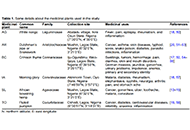 Metals and metalloid in medicinal plants: occurrence and risk assessment to human healthOpen AccessOriginal ArticleAim: This study was aimed at determining the levels of trace elements in six medicinal plants of tropical origin. Methods: The levels of As, Cd, Co, Cu, Fe, Mn, Ni, Pb, and Zn in Albizia gl [...] Read more.Joseph A. Adeyemi ... Fernando BarbosaPublished: April 26, 2024 Explor Foods Foodomics. 2024;2:171–182
Metals and metalloid in medicinal plants: occurrence and risk assessment to human healthOpen AccessOriginal ArticleAim: This study was aimed at determining the levels of trace elements in six medicinal plants of tropical origin. Methods: The levels of As, Cd, Co, Cu, Fe, Mn, Ni, Pb, and Zn in Albizia gl [...] Read more.Joseph A. Adeyemi ... Fernando BarbosaPublished: April 26, 2024 Explor Foods Foodomics. 2024;2:171–182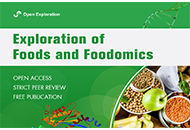 Roles of nutrition in minimizing stress-related infertility: a narrative reviewOpen AccessReviewInfertility is a crucial and common health issue worldwide, that affects people both physiologically and psychosocially. The condition is described as the disease of the reproductive system of eithe [...] Read more.Luxita Sharma, Dhananjay SharmaPublished: April 19, 2024 Explor Foods Foodomics. 2024;2:155–170
Roles of nutrition in minimizing stress-related infertility: a narrative reviewOpen AccessReviewInfertility is a crucial and common health issue worldwide, that affects people both physiologically and psychosocially. The condition is described as the disease of the reproductive system of eithe [...] Read more.Luxita Sharma, Dhananjay SharmaPublished: April 19, 2024 Explor Foods Foodomics. 2024;2:155–170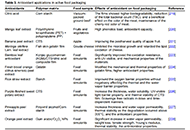 Recent advances in nano-related natural antioxidants, their extraction methods and applications in the food industryOpen AccessReviewNatural antioxidants, such as phenolic compounds, carotenoids, vitamins, and microelements, are predominant in fruits, vegetables, herbs, and spices. The accretion interest of consumers in utilizing [...] Read more.Ayla Elmi Kashtiban ... Sayna ZahediniaPublished: April 19, 2024 Explor Foods Foodomics. 2024;2:125–154
Recent advances in nano-related natural antioxidants, their extraction methods and applications in the food industryOpen AccessReviewNatural antioxidants, such as phenolic compounds, carotenoids, vitamins, and microelements, are predominant in fruits, vegetables, herbs, and spices. The accretion interest of consumers in utilizing [...] Read more.Ayla Elmi Kashtiban ... Sayna ZahediniaPublished: April 19, 2024 Explor Foods Foodomics. 2024;2:125–154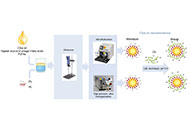 Development of chia oil-in-water nanoemulsions using different homogenization technologies and the layer-by-layer techniqueOpen AccessOriginal ArticleAim: The present study investigates the influence of various homogenization techniques, namely high-pressure valve homogenization and microfluidization, and different forms of modified sunflower [...] Read more.Luciana M. Julio ... Vanesa Y. IxtainaPublished: April 10, 2024 Explor Foods Foodomics. 2024;2:107–124
Development of chia oil-in-water nanoemulsions using different homogenization technologies and the layer-by-layer techniqueOpen AccessOriginal ArticleAim: The present study investigates the influence of various homogenization techniques, namely high-pressure valve homogenization and microfluidization, and different forms of modified sunflower [...] Read more.Luciana M. Julio ... Vanesa Y. IxtainaPublished: April 10, 2024 Explor Foods Foodomics. 2024;2:107–124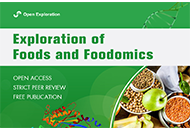 High intake of sunflower seeds and low mortality from Alzheimer’s disease and dementia: is there a correlation?Open AccessPerspectiveAlzheimer’s disease, a progressive and irreversible neurodegenerative disorder, is the most prevalent form of dementia with an increasingly growing incidence rate worldwide. As no effective therap [...] Read more.Katrin SakPublished: March 18, 2024 Explor Foods Foodomics. 2024;2:101–106
High intake of sunflower seeds and low mortality from Alzheimer’s disease and dementia: is there a correlation?Open AccessPerspectiveAlzheimer’s disease, a progressive and irreversible neurodegenerative disorder, is the most prevalent form of dementia with an increasingly growing incidence rate worldwide. As no effective therap [...] Read more.Katrin SakPublished: March 18, 2024 Explor Foods Foodomics. 2024;2:101–106